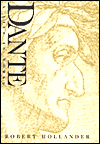

 |

|

The average rating for Dante based on 2 reviews is 3.5 stars.
Review # 1 was written on 2019-10-19 00:00:00 Ramiro Garcia Ramiro GarciaI picked this up as my introduction to Dante because I'm planning to use the Hollander translation of the The Divine Comedy. Jean Hollander published a verse translation, and Robert Hollander, the author here and her spouse, edited it, writing all the notes. So, I wanted to get a sense of what he's like and his thought process. It's not exactly a fun read, but it's well constructed, clean, slim, and a very readable walk through of Dante's works. It's also heavy on sources in the citations, and probably a great place for someone studying Dante in 2001 to start. Now, they would be better off using Hollander's online Princeton Dante Project. I liked the balanced* take and closed the book feeling I had gotten off to a good start. So, recommended if this interests you. Born in 1265 in Florence, Dante wrote a number of works that got spread around. In his twenties he began writing Vita Nuova, an Italian work that was a mixture of verse with prose explanations. It's here that he first works out the Beatrice story, how he saw her when she was nine, and then again nine years later, and apparently barely said a word to her before the real Beatrice died of an epidemic that was passing through Florence in 1290 (She was 25). This first collection was published in 1292. Other than this, his other preserved works for about the next decade are individual Italian poems, eventually collected and now known as his Rimes. But Dante was becoming politically active, gaining a key political position in Florence, one that left him vulnerable when the winds changed suddenly. Dante was in Rome when his anti-papal, pro-emperor White Guelphs were suddenly run out by the papal Black Guelphs in 1302, and found himself permanently exiled from Florence. It's at this point, politically sidelined, and dependent on benefactors, that Dante would begin to focus on writing again. He began, but never finished, Convivio, a major Italian work where he criticizes Italian and praises Latin. Convivio is distinct from Vita Nuova partially in that much of the prose is independent of any verse. Also, shockingly, because here he says he has a new love...in place of Beatrice is a Lady Philosophy. Then in Latin he wrote a long essay praising the vulgar languages and their use in De vulgari eloquentia. This was a medieval game of praising a language only in another language, but regardless the sum total is roughly a defense of his creation of the Comedia, the main work of his life, famously in Florence's Italian. He would finish the Comedia shortly before he died in 1321. But meanwhile he would keep writing other works, including De Monarchia, a Latin prose political argument for a new Roman-style Emperor to rule, but still follow in spirit the clearly corrupt pope. He apparently had great hopes for the Holy Roman Emperor Henry VII, who came into northern Italy in an effort to conquer. But Henry VII died suddenly of malaria in 1313, probably leaving a very unsettled and disappointed Dante, who seems to deal gently with this in his Comedia. And Dante also wrote some Eclogues in Latin, in some imitation of his hero, Virgil (who was, of course, also pro-emperor). But Comedia, later characterized by Boccaccio as Divina, is clearly his major work and masterpiece, and his effort to essentially collect all the philosophical knowledge of his time, and put it together in a kind of compelling narrative in verse: a one week visit to Hell, Purgatory and Heaven, guided, mainly, by a flawed pre-Christian Virgil, and protected by the spirit of Beatrice, who becomes a kind of Christ figure. I found it interesting that as Dante matured beyond and evolved in ways different from his younger works, he never repudiated them. Instead, it seems all his later works were, in way, a continuation of all his other works and the bibliography should be considered in sum, at least to a degree. My takes from all this is that I want to read more (but probably not all) of Dante‘s work. I'll start Vita Nuova soon (have two translations from my library). Some of his work is a bit hard to find, but it's all available in translation on Hollander's Princeton Dante Project website. So, I'll use that for his Rimes, for example. And, I‘m going to slow down my plans and set aside more time before and while reading his works to read about this work. *I was entertained when one of Hollander's notes cites himself, and then in 3rd person points out what Hollander got confused. ----------------------------------------------- 48. Dante : A Life in Works by Robert Hollander published: 2001 format: 212 page paperback acquired: September read: Oct 3-12 time reading: 9 hr 49 min, 2.8 min/page rating: 4 |
Review # 2 was written on 2017-08-20 00:00:00 JAMES INGRAM JAMES INGRAMThe reader needs an exceptionally strong background in Dante and the structural components of Italian literature. This reader fails on both counts and thus is becomes, through likely no fault of the author, one of the few books I couldn't finish. |
CAN'T FIND WHAT YOU'RE LOOKING FOR? CLICK HERE!!!